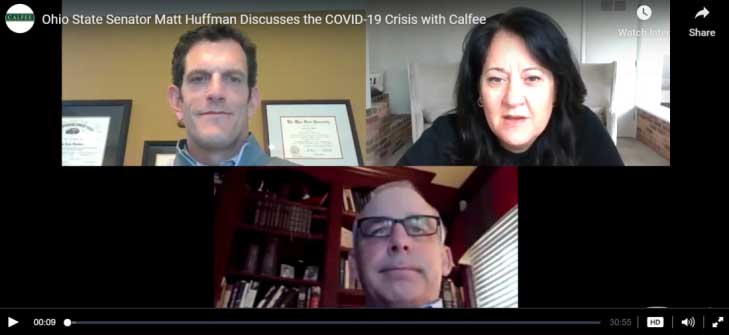Past Webinar Recordings
1.28.2021 – Understanding Ohio’s Revised Non-Discrimination Laws
Ohio Governor Mike DeWine recently signed into law House Bill 352 (HB 352), which will bring welcome changes regarding important aspects of employment-related discrimination law in Ohio. These changes will become effective 90 days after filing with the Secretary of State. Attorneys with Calfee's Labor & Employment attorneys discussed these significant changes.
10.29.2020 – Calfee's Labor & Employment Webinar - Workplace Issues 2020: COVID-19 and Beyond
Calfee's Labor and Employment and Workers’ Compensation attorneys covered the issues employers face amidst the continuing COVID-19 pandemic and beyond.
8.18.2020 – Pooled Employer Plans: Background and Benefits for Private Equity and Other Financial Services Firms
Calfee attorneys Steven W. Day (Partner, Employee Benefits and Executive Compensation practice), and moderator Patrick D. Hayes (Senior Counsel, Investment Management and Corporate and Finance practice) were joined by Terrance P. (Terry) Power, ERPA, CFP®, QPA®, CRPS®, (President and CEO, The Platinum 401k) and Philip S. (Phil) Scott (Registered Representative, Private Client Services, Investment Advisor Representative, Strategic Capital Advisers) for a discussion of Pooled Employer Plans (PEP).
View a transcript of this webinar.
7.08.2020 – What in the (COVID) World are Apple & Google Up To? – Data Privacy in Times of Public Crisis
Calfee attorneys Dan McMullen (Partner, Intellectual Property practice group and Leader of the Information Technology Law practice) and Billy Raulerson (Vice Chair, Intellectual Property practice group) held a lively and informative exchange on whether and how AGENS may help us to exit the Coronavirus lockdown "through the App Store."
View a transcript of this webinar.
6.24.2020 – Webinar with Calfee and Marsh Insurance
Calfee attorneys K. James Sullivan (Partner, Insurance Recovery practice) and Larry Wilcher (Of Counsel, Business Restructuring and Insolvency practice and Corporate and Finance practice; former General Counsel of Bass Pro Group, LLC and Dollar General Corporation) were joined by Marsh's Mac Nadel, (U.S. Retail/Wholesale, Food & Beverage Industry Leader), Carl W. Patchke, Esq. (Senior Casualty Claims Advocate) and Mary Anne Mullin (Senior Management Liability and Cyber Claims Advocate) for a discussion of COVID-19 insurance claim and coverage strategies for retail and restaurant businesses.
View a transcript of this webinar.
6.11.2020 – Virtual Discussion With Ohio Treasurer Robert Sprague
Leah Pappas Porner (Chair, Government Relations and Legislation) and Blake Beachler (Practice Leader, Public Finance) were joined by Ohio Treasurer Robert Sprague where they discussed the impact of COVID-19 on the state of financial systems, the fiscal health of the State of Ohio and local governments, and the initiatives the Treasurer is working on to help individuals, businesses and government entities weather this crisis.
View a transcript of this webinar.
6.02.2020 – Virtual Roundtable with Cuyahoga County Executive Armond Budish
Cuyahoga County Executive Armond Budish joined Ray Tarasuck and Michael Bowen, attorneys with Calfee's Government Relations and Legislation practice group for a discussion regarding Cuyahoga County’s response to COVID-19.
View a transcript of this webinar.
5.18.2020 – Neutralizing Financial Distress in the Time of COVID-19
Karl Beus (Co-Chair, Corporate and Finance Group), Gus Kallergis (Co-Chair, Business Restructuring and Insolvency Group), Ann Seger (Partner, Corporate and Finance Group), and Mara Cushwa (Chair, Real Estate Law Group) hosted a discussion focused on how businesses can best navigate the financial stress that they and their business partners may be experiencing as a result of the COVID-19 pandemic.
5.14.2020 – Calfee Labor and Employment Webinar: Responsible Reopening and Beyond
Jennifer Colvin (Senior Counsel, Labor & Employment), John Cernelich (Chair, Labor & Employment), Jennifer Whitt (Senior Counsel, Workers' Compensation) and Todd Palmer (Vice Chair, Labor & Employment) discussed the challenges employers will face as businesses reopen amidst the continuing COVID-19 pandemic and addressed the current state of the economy during this webinar.
View a transcript of this webinar.
5.06.2020 – Calfee Hosts Roundtable Discussion with Cleveland Mayor Frank Jackson
Brent Ballard, Calfee's Managing Partner, and Ray Tarasuck and Michael Bowen, attorneys with Calfee's Government Relations and Legislation practice group, hosted a webinar roundtable discussion with Cleveland Mayor Frank G. Jackson where the Mayor discussed the city's strategic COVID-19 Recovery Plan.
View a transcript of this webinar.
04.24.2020 – Calfee Hosts Roundtable Discussion Webinar With Ohio State Senator Matt Huffman
Leah Pappas Porner, Chair, and Josh Sanders, Vice Chair of Calfee's Government Relations and Legislation practice group, hosted a roundtable discussion webinar with Ohio State Senator Matt Huffman in which he discussed the Senate’s efforts to help Ohio through the COVID-19 crisis, including steps the Chamber has already taken and efforts they are currently pursuing for future legislative action.
View a transcript of this webinar.
The opinions expressed by guest speakers and panelists during Calfee webinars may not necessarily reflect the view points of the attorneys and professionals of Calfee, Halter & Griswold LLP or its subsidiaries or affiliates. Calfee’s educational content is intended to inform and educate readers about legal developments and is not intended as legal advice for any specific individual or specific situation. Please consult with your attorney regarding any legal questions you may have. With regard to all content including case studies or descriptions, past outcomes do not predict future results. Updates related to all COVID-19 government assistance programs are provided with the most current information made available to Calfee at the time of publication. Clarifications and further guidance are being disseminated from government authorities on an ongoing basis. All information should be reaffirmed prior to the submission of any application and/or program participation.
Check out our video series, Calfee NOW, which features brief conversations with policymakers and industry leaders offering insights on Noteworthy topics, associated Opportunities and trends to Watch for in the near future.
Calfee invites you to visit our COVID-19 Resource Center containing First Alerts to help guide you through the challenges faced by individuals and organizations as a result of the novel coronavirus outbreak.
Subscribe to receive legal alerts, seminar invitations and other announcements.

